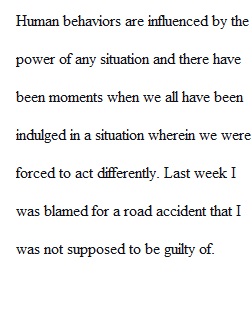


Q 43. Provide a personal example of an experience in which your behavior was influenced by the power of the situation.
Q 44. Think of an example in the media of a sports figure—player or coach—who gives a self-serving attribution for winning or losing. Examples might include accusing the referee of incorrect calls, in the case of losing, or citing their own hard work and talent, in the case of winning.45. Try attending a religious service very different from your own and see how you feel and behave without knowing the appropriate script. Or, try attending an important, personal event that you have never attended before, such as a bar mitzvah (a coming-of-age ritual in Jewish culture), a quinceañera (in some Latin American cultures a party is given to a girl who is turning 15 years old), a wedding, a funeral, or a sporting event new to you, such as horse racing or bull riding. Observe and record your feelings and behaviors in this unfamiliar setting for which you lack the appropriate script. Do you silently observe the action, or do you ask another person for help interpreting the behaviors of people at the event? Describe in what ways your behavior would change if you were to attend a similar event in the future?46. Name and describe at least three social roles you have adopted for yourself. Why did you adopt these roles? What are some roles that are expected of you, but that you try to resist?47. Cognitive dissonance often arises after making an important decision, called post-decision dissonance (or in popular terms, buyer’s remorse). Describe a recent decision you made that caused dissonance and describe how you resolved it.
View Related Questions